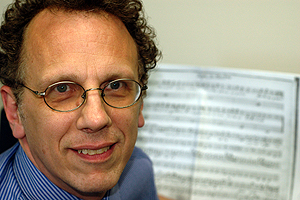Robert Kendrick, Chairman and Associate Professor of Music
By Jennifer CarnigNews Office
 Robert Kendrick | |
The secret to good graduate teaching, says Robert Kendrick, Chair and Associate Professor of Music, is to always remember that the future of the field you love lies in the hands of your students.
“They’re the ones who are going to replace you and who are hopefully going to take the discipline further,” he says. “You’ve got to try and give them the best of your experiences, but also nurture their perspectives and ideas because you want them to do new and different work. Ultimately, you want to give them the tools to be their own unique scholarly individuals.”
Kendrick has apparently been succeeding in that mission. He is one of four professors honored this year by students with the Faculty Award for Excellence in Graduate Teaching. At this University, though, Kendrick says being a good teacher is easy.
“The graduate students here are remarkable,” he says. “They’re very iconoclastic and independent and they have very high expectations of each other and their faculty, and that means you genuinely want to engage with them and live up to their expectations.”
Kendrick, who came to the University in 1997, specializes in the music of early-modern Europe and its intersections with religion, politics, gender, urban culture and the fine arts. He has taught courses on such topics as medieval chant and song, Monteverdi’s opera L’incoronazione di Poppea, motets in 16th-century Europe and Senecan heroines in classical drama and baroque opera.
Though Kendrick is an expert on these subjects, he is quick to applaud his students for asking the difficult questions and delivering the challenges that improve his scholarship. He genuinely enjoys teaching, he says, and he never regrets the time commitment that his work in the classroom demands.
“These students make my own work better,” Kendrick says. “They come from totally different perspectives and don’t take the same things for granted as I do, and so they come up with these questions that I would never come up with that make me question my own approach. It’s a widely shared belief by everyone in this department that our students really do help take our own work to the next level.”
Kendrick earned his Ph.D. and two M.A. degrees—one in urban ethnomusicology and another in musicology—from New York University, and he says he looks back on his own graduate education for guidance on how he can best assist and work with his students. He says he is guided by two mental lists; things you want to “avoid subjecting people to ever again” and the “very, very good things” that he wants to emulate.
The guiding principle, he says, is to simply “stay humble and realize that you’re never too old to improve your teaching. You’ve got to constantly examine yourself critically and pay attention to what works and what doesn’t work.”
Mostly, what Kendrick says he tries to do is respect his students and all of the many demands that are being made of them.
“The field has changed,” Kendrick says. “So much has happened in pop music and media technology that they will be asked to teach. They have a lot more on their plate than we do—they have to be ready to talk about everything from deejays to sampling to early music. They’re really quite impressive.”
In his own research, Kendrick is currently studying music in Catholic Holy Week liturgy, including not only the Renaissance and Baroque periods in Europe, but also Latin American music.
Kendrick was named Academician by the Accedemia di San Carlo in Milan last year, and he was awarded fellowships by the National Humanities Center (1998-1999) and the Harvard University Society of Fellows (1993-1996).
He is author of Celestial Sirens: Nuns and Music in Early Modern Milan (1996) and Sounds of Milan, 1585-1650 (2002).
![[Chronicle]](/images/sidebar_header_oct06.gif)